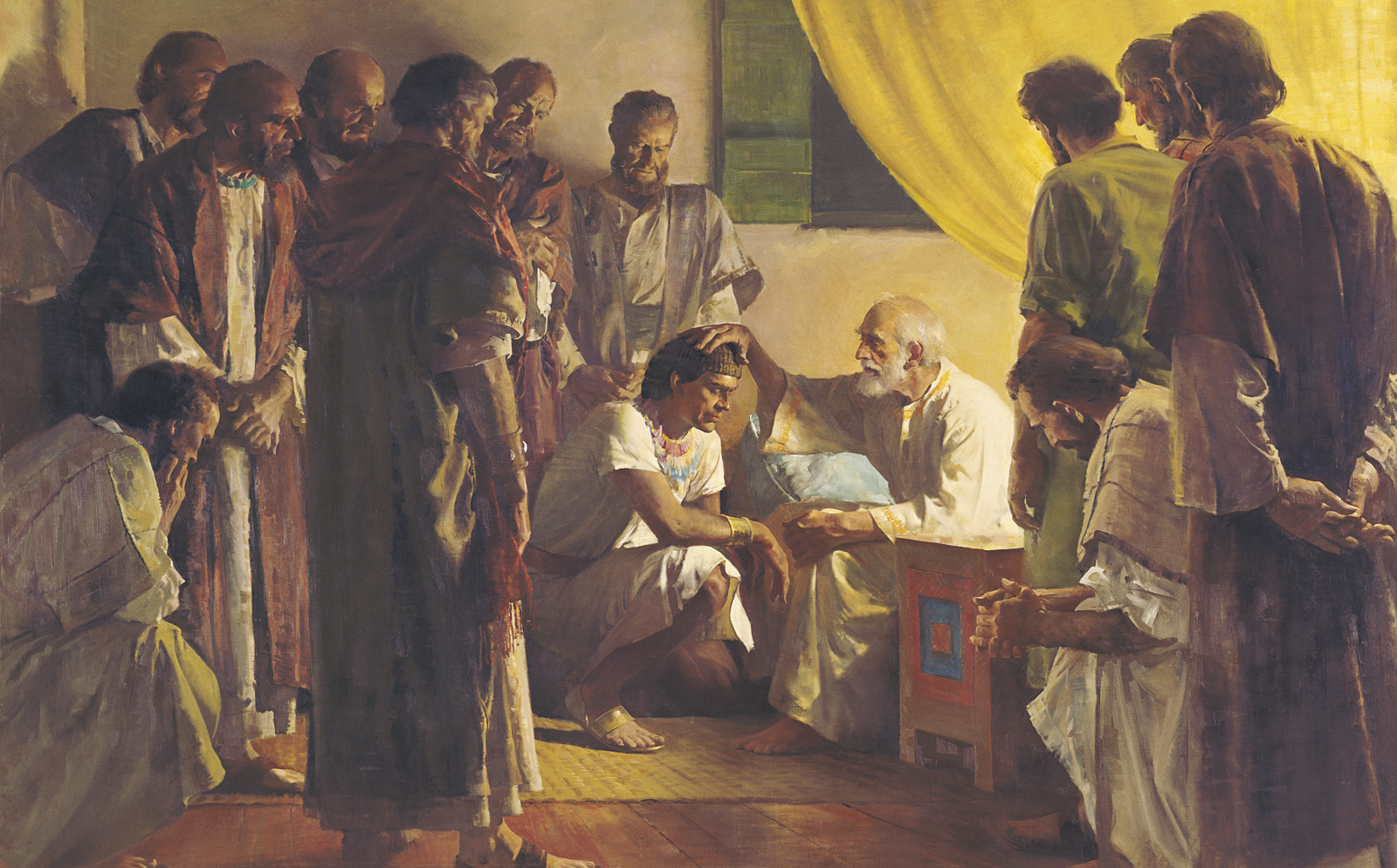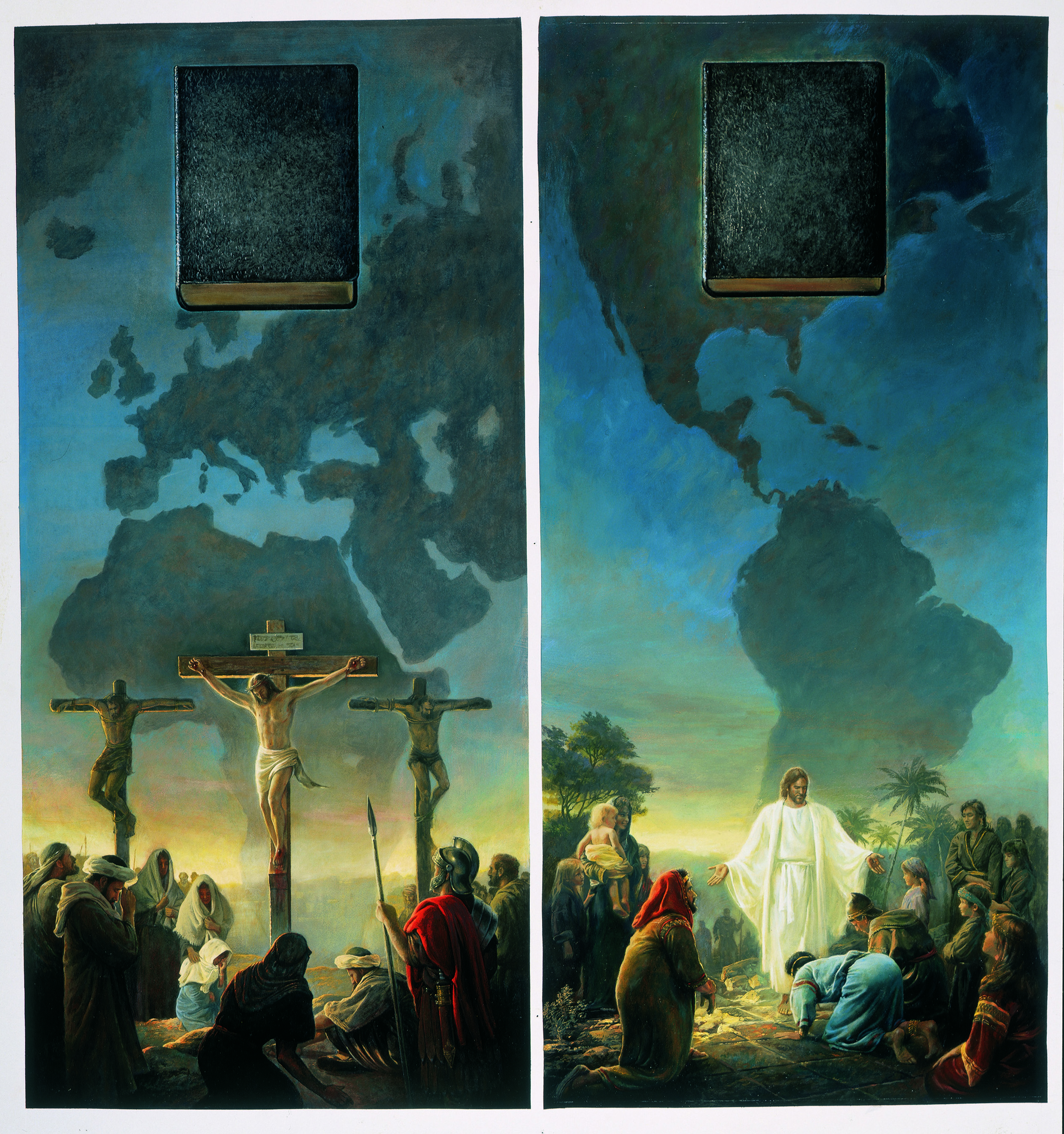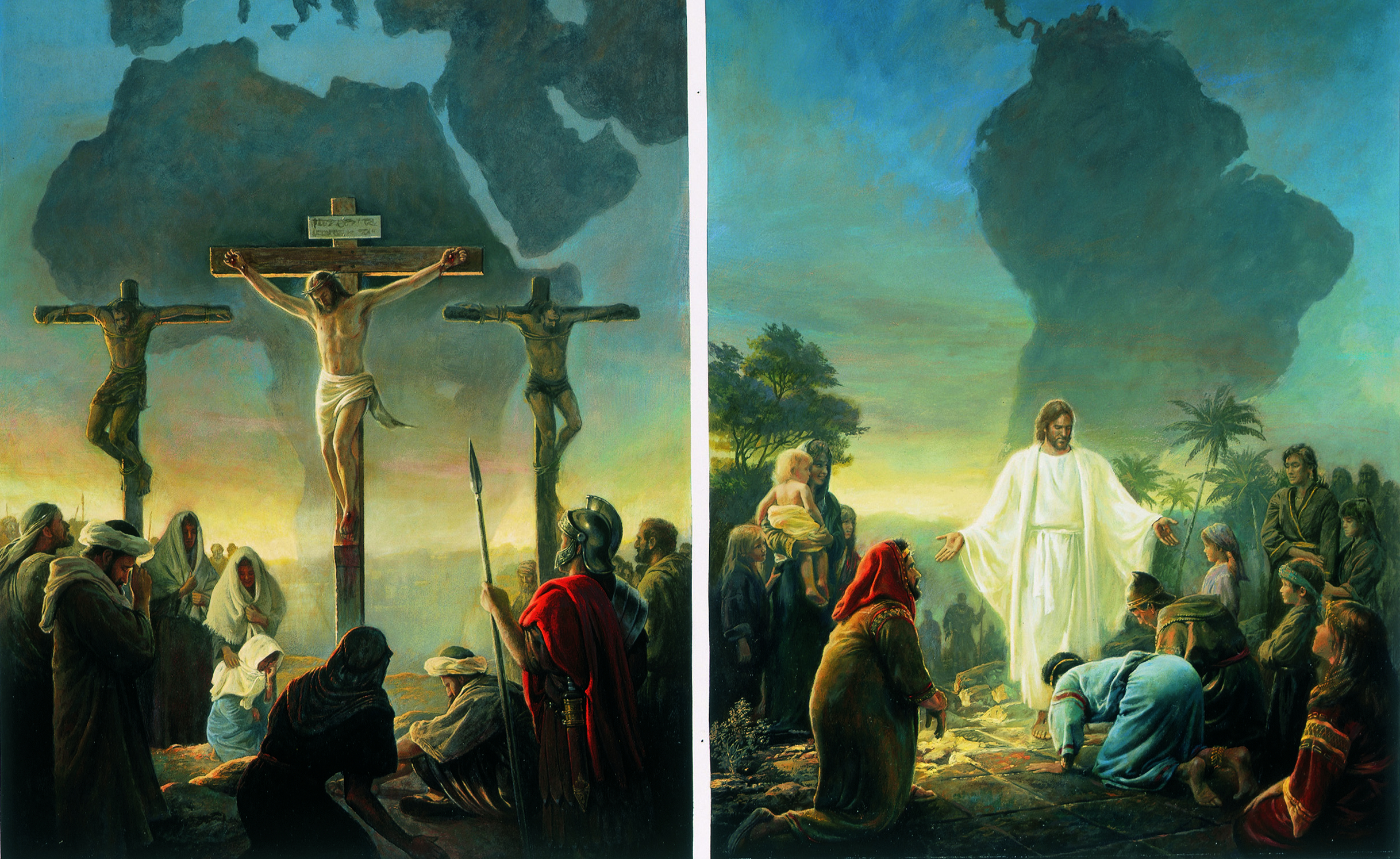According to the Bible, could Jesus Christ have ministered in the Americas after his resurrection?
Why this question? There is an account that states that Jesus Christ visited and taught in the Americas (likely Central America) shortly after his resurrection around 35 AD. The record of his ministry and its results cover roughly 20 chapters of 3 Nephi and 4 Nephi in the Book of Mormon and span more than 100 years. In 3 Nephi, his first appearance is described this way:
And behold, the third time they did understand the voice which they heard; and it said unto them:
Behold my Beloved Son, in whom I am well pleased, in whom I have glorified my name—hear ye him.
And it came to pass, as they understood they cast their eyes up again towards heaven; and behold, they saw a Man descending out of heaven; and he was clothed in a white robe; and he came down and stood in the midst of them; and the eyes of the whole multitude were turned upon him, and they durst not open their mouths, even one to another, and wist not what it meant, for they thought it was an angel that had appeared unto them.
And it came to pass that he stretched forth his hand and spake unto the people, saying:
Behold, I am Jesus Christ, whom the prophets testified shall come into the world. (3 Nephi 8:6-10.)
What Does the Bible Say?
Bible-loving Christians (which I consider myself to be) should ask: What does the Bible say about this?
The answer will depend on how carefully and deeply you read.
A NARROW READING might conclude that anything other than the modern Bible has to be the work of man and not God because it is adding to or taking away from the writings of the Bible (Deut 4:2, Rev 22:18-19).
But this is a lot like the man who once asked me and my friend if we thought God had ever answered our prayers.
“Yes,” we honestly replied.
“Then I want you to leave,” he said, “because I believe you are demonized.”
If only he had also read and believed James 1:5:
“If any of you lack wisdom, let him ask of God, which giveth to all men liberally, and upbraideth [scolds] not, and it shall be given him.” (James 1:5. All verses will be quoted from KJV.)
God will give additional light and knowledge to us through his Holy Spirit (John 16:13). The heavens are not sealed. And if he speaks to me, Kevin Crenshaw, then he surely spoke and speaks to others more worthy than I. And if the Holy Ghost was promised to “shew you things to come,” (John 16:13), which is the definition of prophecy, then he surely spoke other prophets even after Christ’s resurrection (see Acts 10:9-20) and even today.
Their words would be scripture too, and I’d want to know what the Lord said to them. Would you?
A CASUAL READING of the Bible might conclude that there is no mention Christ ministering anywhere but Judea. However, many precious truths in the Bible aren’t obvious—they require us to look more than just skin deep. Otherwise we’re like the Jews who heard his parables but didn’t care enough to ask to understand:
Who hath ears to hear, let him hear.
And the disciples came, and said unto him, Why speakest thou unto them in parables?
He answered and said unto them, Because it is given unto you to know the mysteries of the kingdom of heaven, but to them it is not given.
For whosoever hath, to him shall be given, and he shall have more abundance: but whosoever hath not [does not ask or seek], from him shall be taken away even that he hath.
Therefore speak I to them in parables: because they seeing see not; and hearing they hear not, neither do they understand. (Matt 13:9-13.)
A DEEPER READING of the Bible reveals wonderful truths, “pearls of great price,” that we would do well to “sell all that we have” to possess. (Matt 13:45-6.)
So let’s look deeper….
“Other Sheep I Have … and They Shall Hear My Voice”
The most obvious mention of additional ministries of Jesus Christ is John chapter 10. After explaining his mission to lay down his life for his sheep, he said:
And other sheep I have, which are not of this fold: them also I must bring, and they shall hear my voice; and there shall be one fold, and one shepherd. (John 10:16.)
Who is he referring to? A casual reading would say, “the Gentiles.” However, to understand clearly we need to look at this statement in context, considering: 1) the history of the Lord’s covenants with the house of Israel in both Old and New Testament times, and 2) what Christ actually said to the people during his ministry around Jerusalem.

The Lord’s Covenants with Israel
The Messiah’s coming was crucial to everyone, but it also answered ancient promises made to the house of Israel. God does and must keep all his promises.
Of all the 12 tribes which ones did the Lord love most? The answer is “all of them”—his covenant was with them all. By the time of Christ, only Judah and Levi remained in Jerusalem, the remaining 10 tribes had been “lost” and scattered. “Lost” means lost only to us, however, not to God, because God knew where he had taken them and where they were at that time.
In Genesis, Jacob gave (the tribe of) Joseph a blessing that said:
Joseph is a fruitful bough, even a fruitful bough by a well; whose branches run over the wall:
The archers have sorely grieved him, and shot at him, and hated him:
But his bow abode in strength, and the arms of his hands were made strong by the hands of the mighty God of Jacob; (from thence is the shepherd, the stone of Israel:)
Even by the God of thy father, who shall help thee; and by the Almighty, who shall bless thee with blessings of heaven above, blessings of the deep that lieth under, blessings of the breasts, and of the womb:
The blessings of thy father have prevailed above the blessings of my progenitors unto the utmost bound of the everlasting hills: they shall be on the head of Joseph, and on the crown of the head of him that was separate from his brethren. (Gen 49:22-6.)
The prophecy alludes to the tribe of Joseph having branches that “run over the wall” from the central well where the main tree resides. Joseph’s tribe would be sorely shot at and hated (war, destruction), but would be blessed with “blessings of heaven above,” and numerous posterity, and blessings related to the oceans, and those blessings would prevail even far away in distance and time.
The Book of Mormon describes the full fulfillment of many of these prophecies (and more). It says it was written by prophets of a branch of the house of Joseph who left Jerusalem 13 years before its destruction by Babylon. They were led by the hand of God, through prophets who had testified at Jerusalem, through the Arabian desert and eventually inspired to build boats capable of crossing the oceans, where they settled in a small region of Central America.
Question: if any branch of the house of Israel that “ran over the wall” was at least as faithful as the Jews at Jerusalem, would they NOT qualify for a fulfillment of God’s covenant promises, and especially those regarding the Messiah? And if they did qualify, how would those promises be fulfilled to them in their lifetime? How would they know about it in spite of having been led away, if they had been led “to the utmost bound of the everlasting hills?”
Would it be fair to them to deny them the blessings of the Messiah in their lives just because they had been led away?

What about the Gentiles?
Christ said in John 10:16 that his “other sheep” would “hear his voice.” What does this mean exactly?
In Matthew 15, we read of a Canaanite woman, a Gentile, whose daughter was afflicted with an evil spirit. She had heard of Christ and his teachings. He even spoke to her for a moment or two, but he would not minister to her personally, directly, except as a side effect of preaching to the house of Israel. He said:
I am not sent but unto the lost sheep of the house of Israel. (See Matt 15:22-24.)
In other words, the concept of “hearing his voice” seems to refer to a personal ministry, and he made it clear that his ministry was to all the covenant tribes of Israel. After the resurrected Christ appeared to his disciples in Jerusalem, he gave them a charge to take the gospel to the Gentiles and the whole world:
Go ye therefore, and teach all nations, baptizing them in the name of the Father, and of the Son, and of the Holy Ghost… (Matt 28:18-9.)
The Gentiles should therefore be converted through their preaching, not his. The Gentiles would not at any time “hear his voice” preaching to them directly—that was the mission of the disciples of Christ. His lost sheep, however, could be another matter. In fact, in the Book of Mormon, the Lord explains:
And verily I say unto you, that ye are they of whom I said: Other sheep I have which are not of this fold; them also I must bring, and they shall hear my voice; and there shall be one fold, and one shepherd.
And they understood me not, for they supposed it had been the Gentiles; for they understood not that the Gentiles should be converted through their preaching.
And they understood me not that I said they shall hear my voice; and they understood me not that the Gentiles should not at any time hear my voice—that I should not manifest myself unto them save it were by the Holy Ghost.
But behold, ye have both heard my voice, and seen me; and ye are my sheep, and ye are numbered among those whom the Father hath given me. (3 Nephi 15:21-24.)
In fact, the Book of Mormon makes it clear that Christ’s mission wasn’t just limited to this small branch of Israelites in Central America. He also had a ministry to perform among the remaining lost 10 tribes, wherever they lived at that time.
“There Were Many Other Things Which Jesus Did”
The final verse of the four Gospels, after describing many things Jesus did after his resurrection, says this:
And there are also many other things which Jesus did, the which, if they should be written every one, I suppose that even the world itself could not contain the books that should be written. Amen. (John 21:25.)
This verse used to bother me. The world is awfully big. How could there not be enough space to hold all the books that should be written about the “many other things which Jesus did?” Was John exaggerating? Of course not—instead, I now realize that the word “contain” (in the modern English sense) is a misinterpretation. I wasn’t reading carefully, with an eye of faith, so I never considered the original Greek: χωρέω. That word is most often translated (see list of verses at the bottom of the linked page) as “receive,” meaning “accept” or “believe.” So, properly translated into English, it appears this verse should read:
And there are also many other things which Jesus did, the which, if they should be written every one, I suppose that even the world itself could not accept the books that should be written. Amen. (John 21:25, bold word retranslated from the Greek χωρέω.)
Ask yourself: has the world accepted the other book(s) that that have been written about “many other things which Jesus did” among his lost sheep of the house of Israel as he and his prophets had promised? Books which claim to be ancient scriptures written by further prophets of the house of Israel, to which Jesus actually said he was sent? (See Matt 15:22-24.) Has the world generally accepted the Book of Mormon? Or was John right that the world would not accept such things even if they were written?
The Only Real Proof
Tens of millions have read the Book of Mormon, asked God if it is true, and received a witness from God by the power of the Holy Spirit that it is scripture. The Book of Mormon complements the Bible—adding its witness that the Bible is true in an age when many even doubt the historicity of the Bible.
I invite you to watch the story of Vincenzo di Franchesca. He was one of those who read, then prayed for a witness by the Holy Spirit (as it promises you will receive). As you watch, ask yourself: “How much truth am I willing to receive? And what is price am I willing to pay for truth—the whole truth—in my own life?”
Kevin
Every Good Thing Blog
Kevin Crenshaw is a Mormon who teaches and advises Mormon young men and recently served as a 7-year volunteer seminary teacher for LDS youth. Although he makes every effort to be a careful student of LDS theology and history, the opinions expressed are his own. He is not authorized to speak officially in behalf of The Church of Jesus Christ of Latter-day Saints.


